How to Support a Loved One Following a Brain Injury
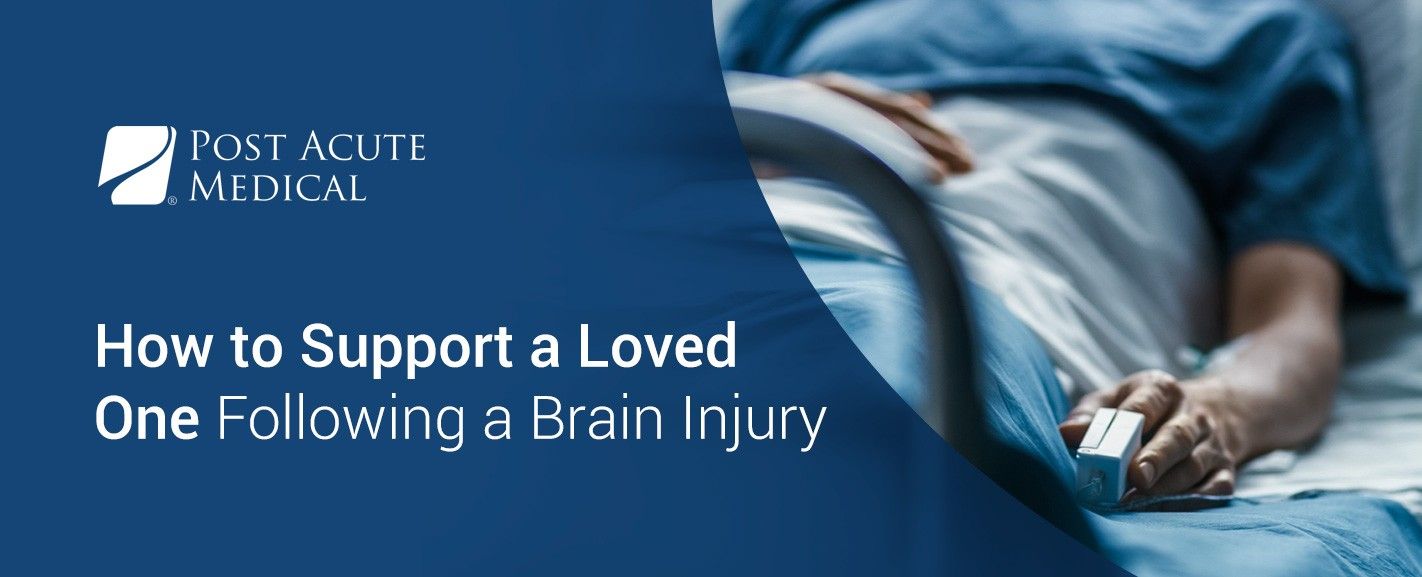
A person with a brain injury is inevitably going to have a difficult time during and after rehabilitation. A cognitive change like a brain injury can require a person to relearn everything all over again, which can be frustrating for the individual — and it can also be stressful for their family and friends.
Knowing how to care for someone with a traumatic brain injury (TBI) or even just how to support them properly is crucial to a successful transition back into everyday life.
So how do you help someone with a traumatic brain injury? The best way to start is by educating yourself and understanding exactly what a brain injury is and how it affects both your loved one and the people around them.
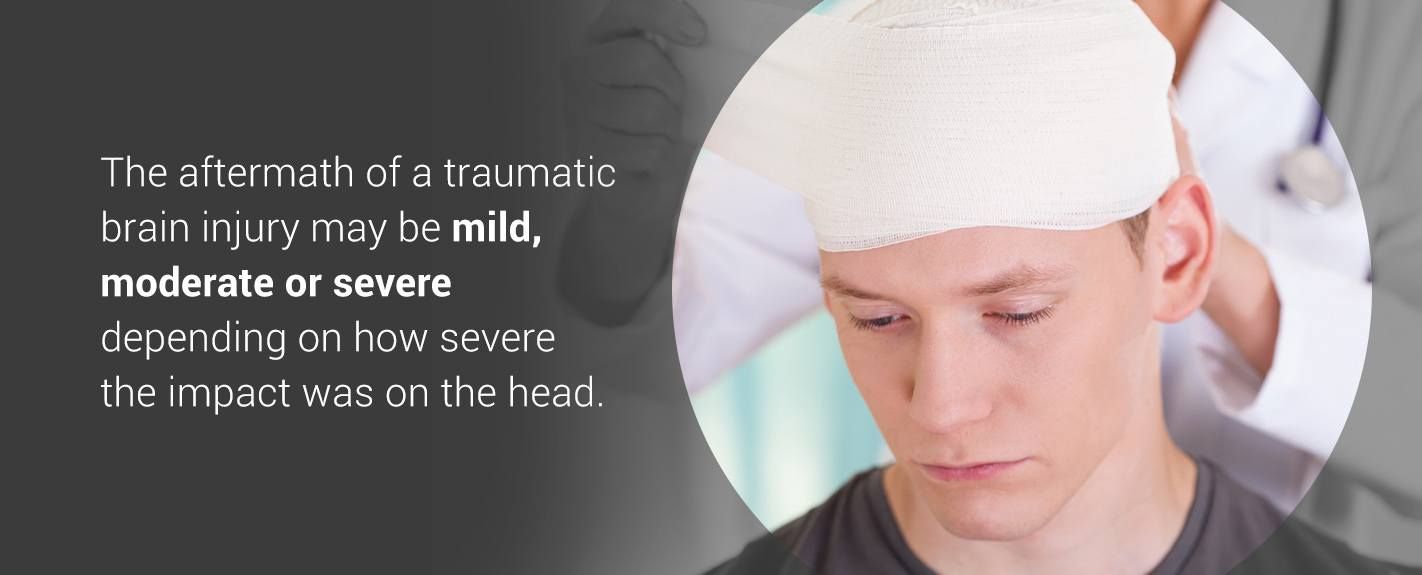
Brain Injury Basics: What You Should Know
A traumatic brain injury is exactly as it sounds. It is any sort of injury in which the brain suffers a blow, be it just a bump to the brain or penetration of it. This sort of injury can be the result of a fall, an act of targeted violence or an accident. Any situation in which your head hits something or has something hit or penetrate it can result in a TBI.
The severity of the symptoms will be told by the severity of the brain injury itself. The aftermath of a traumatic brain injury may be mild, moderate or severe depending on how hard the impact on the head was. Note that a severe brain injury may not cause any external injuries.
Mild and moderate injuries are more likely to have temporary symptoms while severe injuries are more likely to have long-term or permanent symptoms. For example, a mild concussion from accidentally walking into a pole will likely have no long-term effects while a bullet that penetrates the skull could drastically alter the life of the victim.
People who have encountered traumatic brain injuries can experience a range of symptoms that suggest a visit to the hospital, including:
- Dizziness
- Loss of consciousness
- Mood swings
- Trouble remembering
- Slurred speech
- Dilated pupils
- Headache that only gets worse
- Nausea or vomiting
The most severe cases can result in a coma, vegetative state or brain death.
Regardless of the severity of the injury, chances are that the life of the injured person will change — sometimes drastically, depending on the type of brain injury they suffer and the disabilities that occur as a result.
Different Types of Brain Injuries and Their Symptoms
Generally, TBIs are divided up into three umbrella terms:
- Closed head: An injury in which there is no visible or open head wound.
- Open wound: An injury in which there is a visible wound that exposes the brain to penetration.
- Crushing brain: An injury in which the brain is crushed between something.
Closed head injuries are the most common traumatic brain injuries, but the severity of the injury is not always apparent in its initial symptoms. For example, someone with a minor concussion may lose consciousness but be perfectly fine in the long run while someone with a more severe injury may show no symptoms at all in the immediate aftermath of the injury.
It is crucial to see a doctor if you experience any blows to the head. Doctors can determine which category the injury falls into and what steps to take to minimize long-term damage.
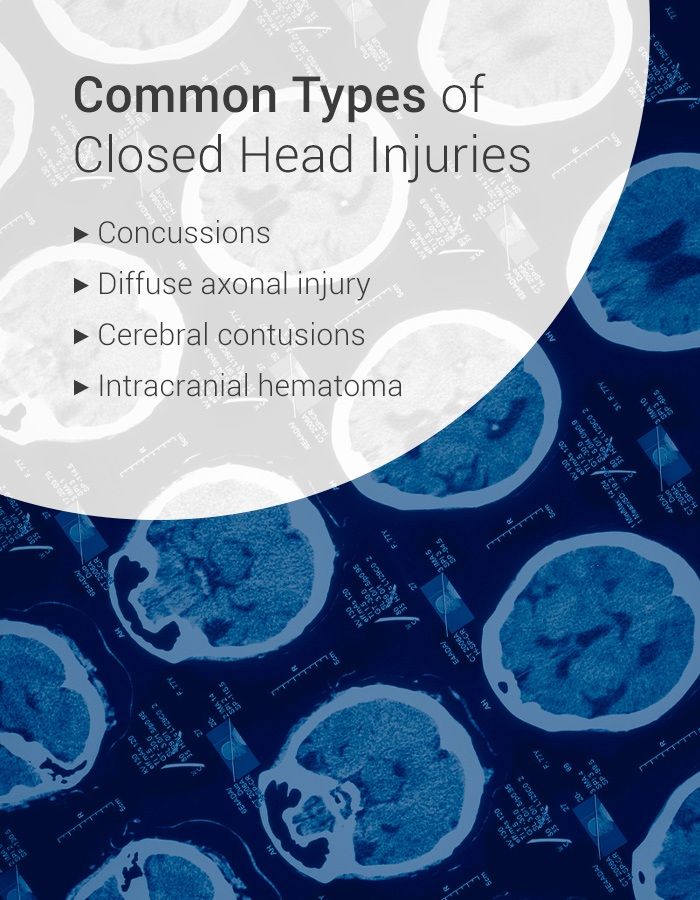
1. Closed Head Injuries
While a closed head injury does not open the head at all and is the most common type of injury —75% of all brain injuries are closed head injuries — it can still be severe. Because you do not see an external wound and because symptoms are not always immediate, it can be hard to detect this type of injury.
Some common types of closed head injuries include:
- Concussions: Usually concussions are only temporary, and the symptoms of a concussion improve and disappear eventually. However, if you get multiple concussions over time, those are multiple brain injuries, which can lead to long-term damage. Because a concussion can cause internal swelling, it needs to be treated by a doctor immediately, or it could be fatal.
- Diffuse axonal injury: This type of injury occurs when the head is shaken very hard and very suddenly, like from whiplash or shaken baby syndrome. The sudden jerking movement injures the neurons in the brain, which can lead to permanent brain damage.
- Cerebral contusions: This injury is the result of bruising of the brain and only impacts the function of the affected area. However, depending on which part of the brain gets bruised, a cerebral contusion can be fatal.
- Intracranial hematoma: The trauma of a head injury can sometimes rupture a blood vessel in the head, and the spilled blood can pool around the brain, causing intense pressure that can become fatal without prompt treatment.
Symptoms of a closed head brain injury may seem mild but should be checked out right away. Some of the most common symptoms include:
- Nausea or vomiting
- Headaches
- Cognitive problems, including memory loss, hallucinations and difficulty speaking
- Any vision changes or dizziness
- Clear fluid leaking from eyes, ears or nose
- Dilated pupils
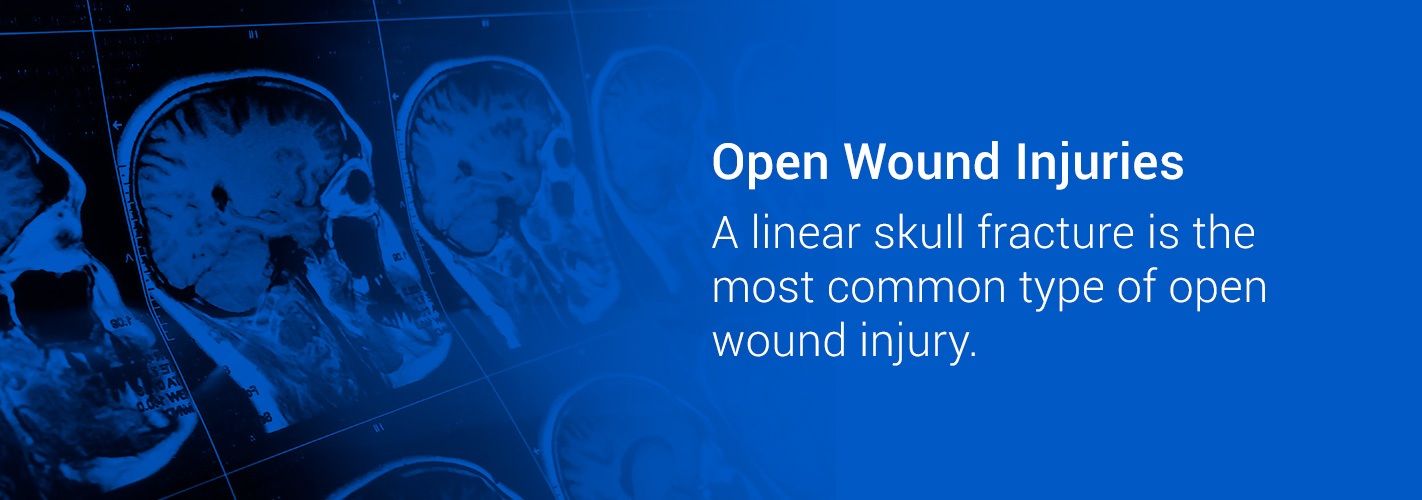
2. Open Wound Injuries
Since an open wound injury results in the skull breaking in some way, there is often more danger of long-term brain damage. While not all open wound injuries result in severe or fatal outcomes, the vulnerability of the brain in this type of injury makes it more likely than with a closed head injury.
Some open wound injuries may only penetrate the skull, but more severe ones can go farther and penetrate the brain as well. The latter is far more dangerous since it has the potential to harm the brain.
A linear skull fracture is the most common type of open wound injury. These are usually the least serious and consist of a crack on the skull. In contrast, a depressed skull fracture results in the skull being penetrated, leaving fragments of bone around or sometimes even in the brain. Major blood vessels can constrict as a result of the break, and the injury can cause serious brain damage.
The least common type of open wound injury is also the most dangerous as it results in the base of the skull collapsing, which then makes it difficult for tissue to hold the brain in place. Displacement of the brain means it is unable to communicate with the spinal cord.
The symptoms of an open wound injury are generally easier to spot since there will be a visible external wound, but the same symptoms that result from a closed head injury can also show up after an open head injury.
How You Can Help a Loved One Navigate a Brain Injury
While there is no official handbook for how to deal with a brain injury, there are some recommended ways to help. It can be frustrating for both the injured person and their loved ones to deal with the lifestyle changes that come after a brain injury, but it is crucial to support the injured person to help them become familiar with their new normal.

If you are wondering how to support a loved one following a brain injury, here are eight tips:
1. Be Patient and Understanding
One of the most important things to remember when figuring out how to care for someone with a traumatic brain injury is that this is probably the worst experience of their life. They likely feel frustrated and impatient with their inability to do the simple tasks they were able to do before the injury. As a result, you must show them the utmost patience and understanding.
Patience can be difficult at times since your loved one may express hostility toward you or you may get tired of having to repeat yourself to them. However, it is important to remember that as frustrated as you get, your loved one is likely more frustrated with themselves.
Educate yourself on their injury and its effects so you better understand why they may be acting as they are. Knowing the "why" behind their behavior can help you practice patience with them since you will understand a bit of what is making them act the way they act. Support groups for people whose loved ones have suffered a traumatic brain injury can also help you better understand their ordeal and provide validation for your feelings.
2. Believe Their Emotions and Pain
Validation is often undervalued, but it can make a world of difference. You may feel like your loved one should not be feeling as tired or should not be as emotional, but the aftermath of a traumatic brain injury does not have a time limit. Your loved one could be dealing with the side effects of the injury for weeks, months or even years after the injury occurred, and these feelings are valid.
A brain injury is exactly that — an injury — and it should be treated as one. That means not doubting or minimizing when your loved one says they are tired or in pain. Avoid saying how lucky they are to be alive or pointing out how much worse others may have it. These kinds of responses minimize the very legitimate feelings of your loved one.
Suicidal ideation is also a possibility for those who have experienced a traumatic brain injury, with the injured person feeling like they do not deserve to have survived the injury. These thoughts and feelings should be taken seriously and not just brushed off. These feelings are real and painful for your loved one and need to be acknowledged and dealt with properly.
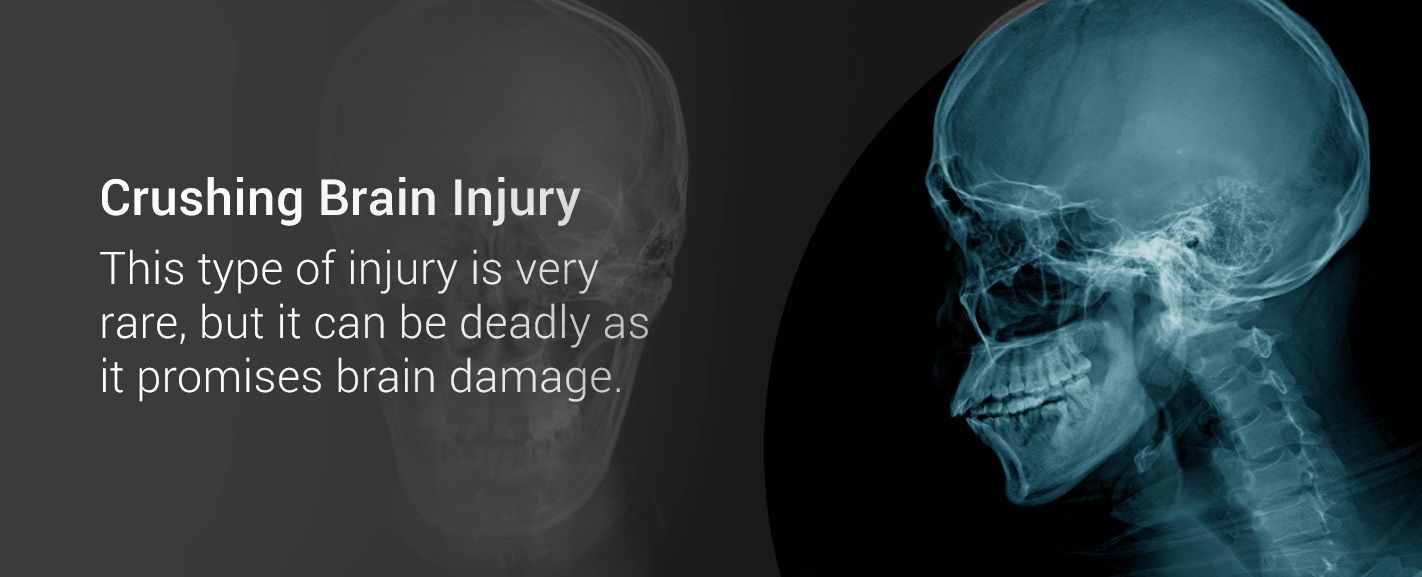
3. Crushing Brain Injury
When the brain — and inevitably the skull as well — get crushed between two objects, it results in the most severe and often most fatal type of traumatic brain injury: a crushing brain injury. This type of injury is very rare but it can be deadly as it promises brain damage. The harder the brain and skull are crushed, the worse the damage will be.
A crushing brain injury in which the skull gets fractured puts the brain in further danger because it no longer has the protection of the skull around it. A crushing brain injury will also result in crushed blood vessels, which will lead to severe bleeds. Symptoms for a crushing brain injury are very easy to spot but can also result in distortion of the shape of the head and face as well as altered motor skills or involuntary movements.
Why Providing Proper Support Matters
When it comes to dealing with a brain injury, there is no exact way to do it — for both the injured person and their loved ones — but it is undeniable that support is crucial. Rehabilitation is more than just physical, and emotional support can do wonders for anyone recovering from an injury.
Family and close loved ones can help medical professionals provide the best care they can by volunteering information about the injured person that only loved ones would know, such as the injured person's general character, the likely choices they would make and their long-term goals. Loved ones are also more likely to detect subtle changes in the injured person that medical professionals may miss simply because they do not have as close a connection to the injured person as their closest friends and family do.
In addition to providing valuable insights about the injured person, proper support from loved ones can have a positive impact on the rehabilitation process. Studies show that TBI support for a loved one encourages them to stick with a proper recovery routine and, as a result, they are likely to fare better than those who are getting the same rehabilitation without proper support.
Brain injuries can often result in drastic changes in personality and behavior, and the unconditional support of loved ones can be a lifesaver. Knowing that the injured person is not alone and has their loved ones —in addition to the medical professionals — to help them out provides a sense of community and security that is irreplaceable.
And it is important to remember to care for yourself as well. Providing TBI support for a loved one can be exhausting and take a toll on your mental health, so find time to prioritize yourself as well so that you are at the top of your game when it comes to supporting your loved one.
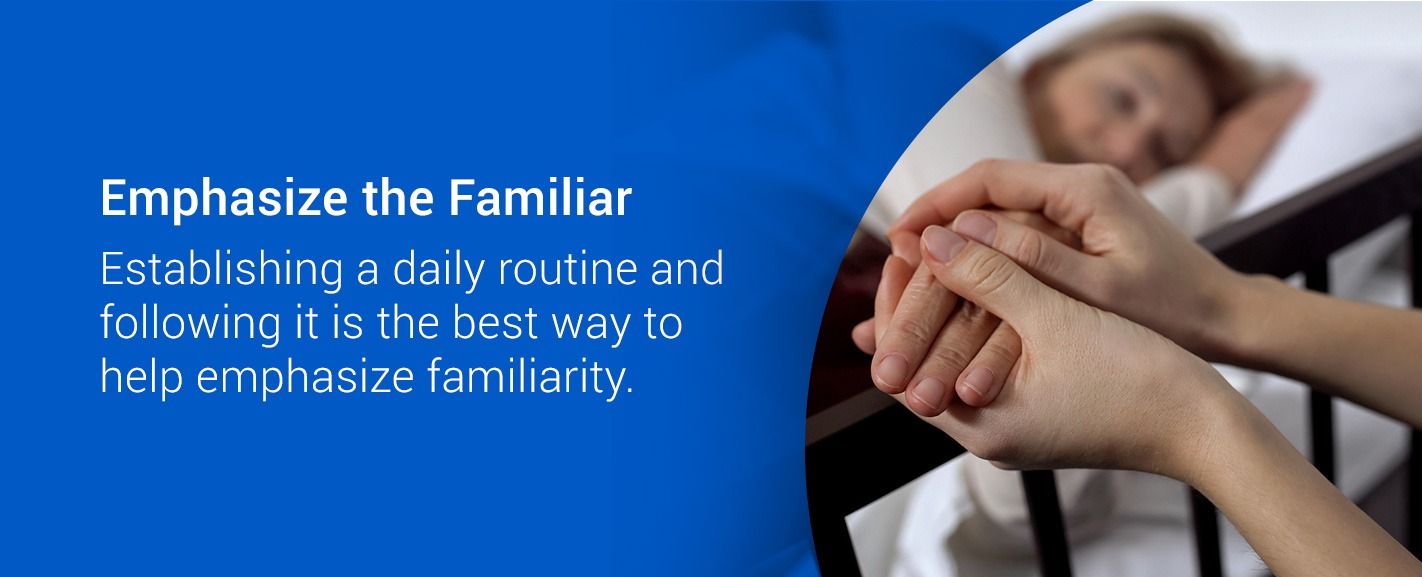
3. Emphasize the Familiar
A life-changing event like a traumatic brain injury can lead to your loved one feeling like their life has become disorganized and haphazard because their brain has physically changed. Helping them find a new normal is a great way to help them get back into feeling more like things are in their control.
Establishing a daily routine and following it is the best way to help emphasize familiarity. Additionally, help your loved one feel involved by including them in conversations, inviting them to certain family events and talking to them as you always have.
TBIs can also affect memory, so gently remind your loved one about familiar places, memories and people. Photo albums and familiar objects are an excellent way to do this. Leave them within reach of your loved one so they can access these objects whenever they want. Positive mementos can also provide a unique comfort for your loved one since they are often emotional triggers.
4. Promote Simplicity and Familiarity
The cognitive effects of a brain injury can make your loved one feel overwhelmed or overstimulated. Especially soon after the injury, try to keep things simple for your loved one. Avoid overloading them with conversations that have lots of new information or subtle or sarcastic jokes as your loved one may have trouble following and get frustrated when they cannot keep up.
Emphasizing the familiar is once again crucial since old information is simpler for your loved one than new information. Photos, light conversation and short social outings help promote familiarity as well as simplicity.
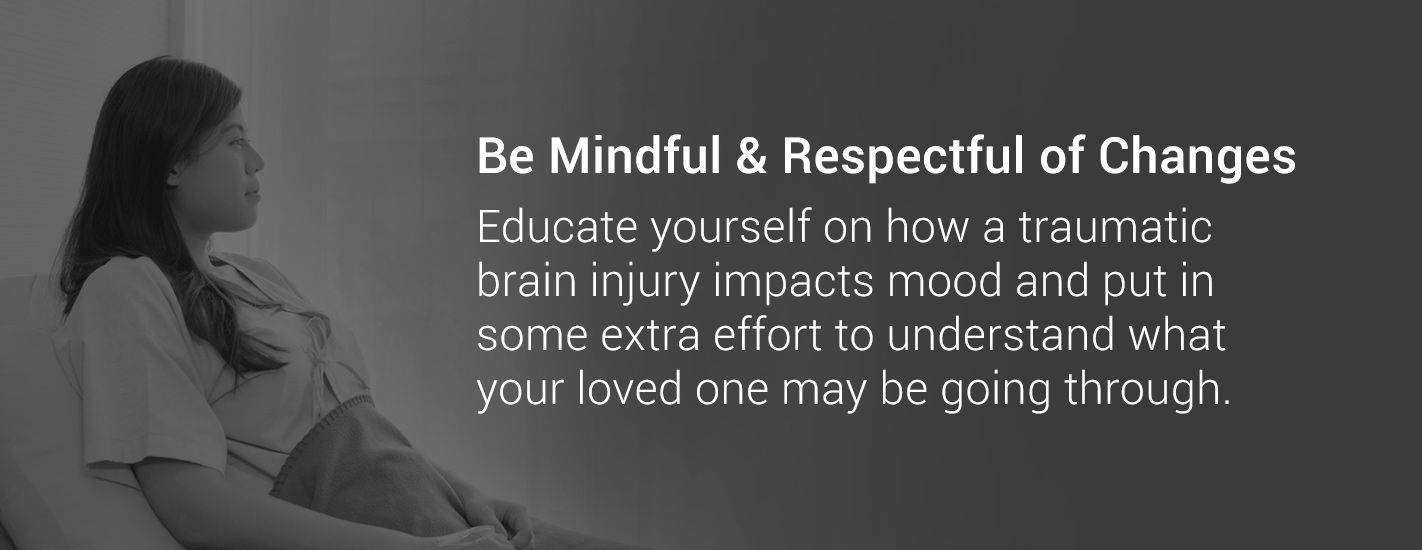
5. Be Mindful and Respectful of Changes
Your loved one may not seem like the same person after their TBI, and they may need you to help them fully accept that fact. The best way to do that is to be mindful of these changes and respect them as the new reality. Your loved one probably already feels frustrated at all the changes in their life following their injury, so help them accept that there is nothing wrong with relearning to live life.
Educate yourself on how a traumatic brain injury impacts mood and put in some extra effort to understand what your loved one may be going through. Try not to take behavioral or emotional changes personally. They are more often than not a symptom of the injury itself and not necessarily how your loved one feels about you. They are likely having trouble expressing themselves and maybe even having trouble doing simple tasks — there is a learning curve for everyone involved.
6. Engage in Simple Acts of Kindness
Offering to do a few loads of laundry or change the bedsheets may not seem like much, but small acts of kindness can be a great help for your loved one. When trying to decide how to care for someone with a traumatic brain injury, remember: a little can mean a lot. Not having to worry about small chores allows your loved one to keep from becoming overwhelmed without falling behind on household tasks.
Helping them get to any appointments they may have is another way to unburden your loved one, as is cooking them a meal or offering to babysit for them if they have children. If your loved one has children, it could be a great help if you offered to take their kids out for the day so they can get some alone time to recuperate since being a parent with a TBI can be even more stressful.
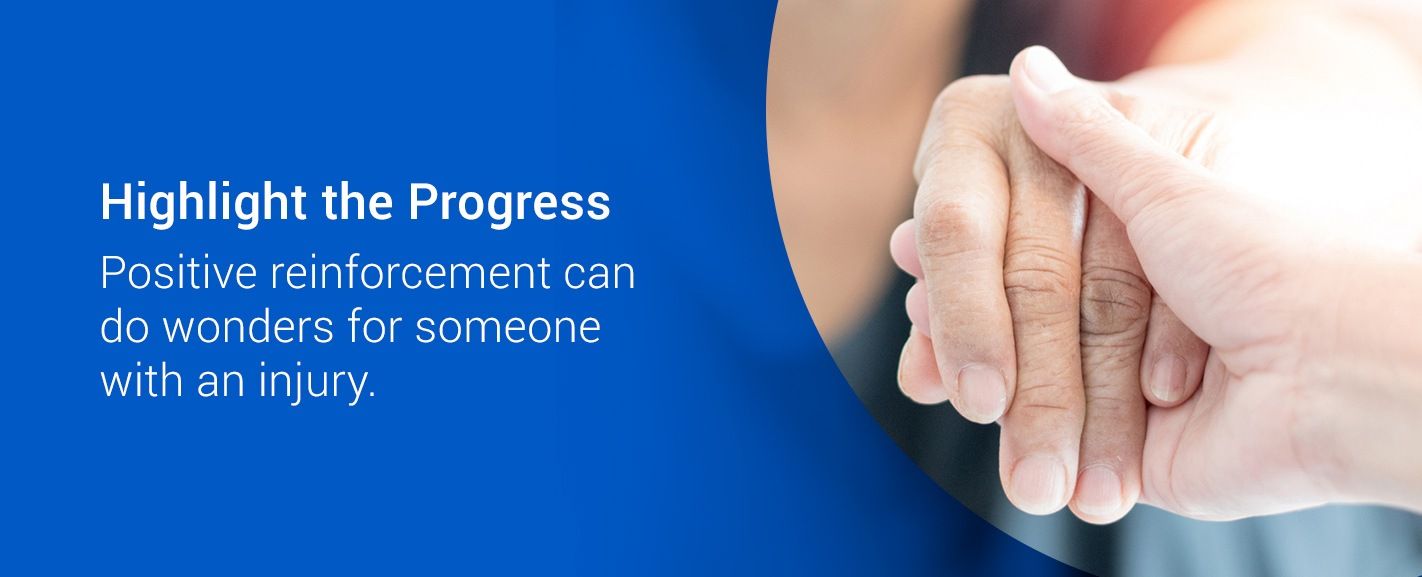
7. Highlight the Progress
Positive reinforcement can do wonders for someone with an injury, and recognizing the great work your loved one has done rehabilitating can improve their self-esteem and confidence. Seeing that all the hard work is leading to visible improvements is also great motivation to continue with rehabilitation, and it can be difficult for your loved one to see the positive changes for themselves.
The right sort of positivity is an asset to recovery, and acknowledgment and encouragement of a job well done is more useful than pointing out how much more fortunate your loved one may be compared to others. Every brain injury is different, and everyone deals with their injury differently. What may be a major accomplishment for one person may not be for another, so recognize what is noteworthy progress for your loved one and celebrate it with them.
8. Do Not Give Up
It can be exhausting and emotionally draining to give proper support to a loved one, but it is also incredibly rewarding and beneficial for everyone involved. Arm yourself with knowledge and take advantage of the many support groups and programs available for caregivers.
Acknowledging the progress your loved one has made is not just for their benefit — use that progress as a way to motivate yourself to keep up the support that is working.

Get Specialized Care at Post Acute Medical
Recovering from a traumatic brain injury is best done with a solid support system that includes medical professionals certified in specific conditions. The staff at Post Acute Medical is determined to offer comprehensive and trans-disciplinary medical care.
We offer inpatient and outpatient services intending to get patients back to their homes and prevent readmissions, and our friendly and caring staff is focused on long-term patient success, using advanced techniques and equipment.
Find a location near you and call for more information or to schedule a tour of the facility.